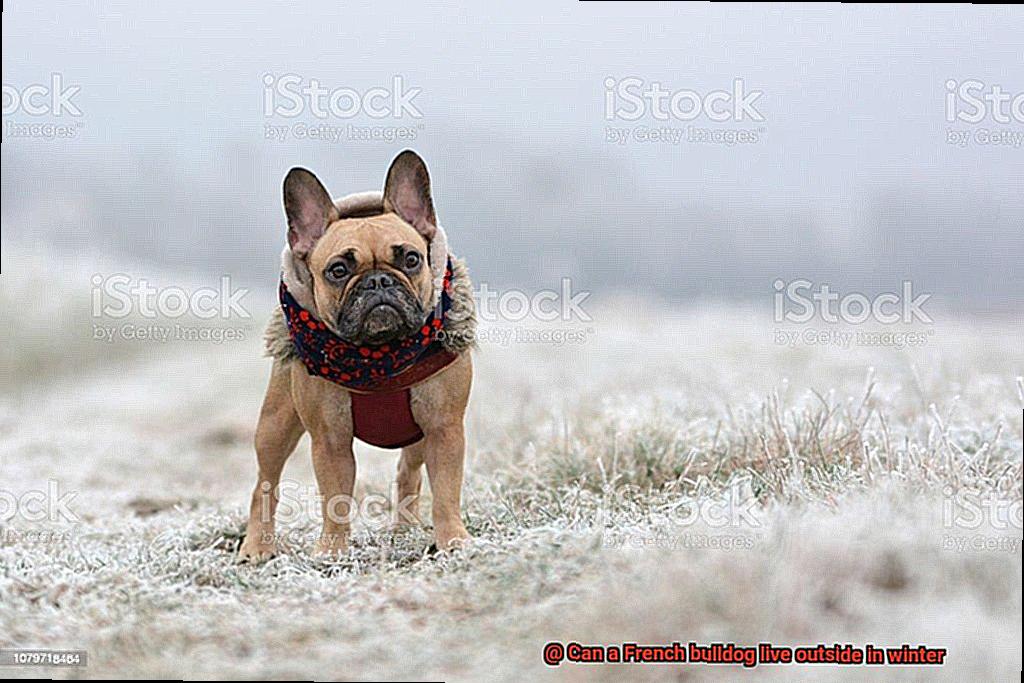Can a French bulldog live outside in winter?
The season of icy winds, snow-covered landscapes, and cozy nights by the fire. But as we humans bundle up in layers of warm clothing, our furry friends are left to face the freezing temperatures with nothing but their natural coats.
So, here’s the burning question on every French Bulldog owner’s mind: can these adorable little bundles of joy withstand the bone-chilling cold? With their playful nature and distinctive looks, French Bulldogs have won over the hearts of dog lovers worldwide.
But before you let your Frenchie loose in a winter wonderland, it’s crucial to understand their unique traits and limitations. Join us as we venture into the world of French Bulldogs and discover whether they can brave the winter elements outdoors.
Understanding Brachycephalic Breeds and the Risks of Cold Weather
Contents
- 1 Understanding Brachycephalic Breeds and the Risks of Cold Weather
- 2 The Short Coat of French Bulldogs and Insulation Against the Cold
- 3 French Bulldogs Need Human Companionship in Winter
- 4 Creating a Well-Insulated Dog House or Shelter for Winter
- 5 Providing Your French Bulldog With Appropriate Winter Clothing
- 6 Monitoring Your Frenchie When Outside in Winter
- 7 Limiting Outdoor Time in Extremely Cold Conditions
- 8 Signs of Hypothermia in French Bulldogs During Winter Months
- 9 Conclusion
Winter is a beautiful season, but it can bring some challenges for our furry friends, especially for brachycephalic breeds like French Bulldogs. These adorable pups with their squishy faces and playful personalities require extra care in cold weather due to their unique anatomy. In this article, we’ll explore the risks of cold weather for French Bulldogs and discuss the measures you can take as a responsible owner to ensure their safety and well-being.
Understanding the Risks:
French Bulldogs have shorter muzzles and narrower nostrils, making it harder for them to breathe in cold air. The chilly weather can worsen respiratory issues such as brachycephalic airway syndrome and elongated soft palate, causing discomfort and difficulty breathing. Additionally, their short coats and reduced body fat make them more susceptible to hypothermia, a dangerous drop in body temperature.
Keeping Your Frenchie Safe:
- Provide Adequate Shelter: Ensure your French Bulldog has a warm and cozy shelter during cold spells. A heated dog house or bringing them inside can provide the necessary protection against the harsh elements.
- Dress for Success: Just like we bundle up in winter clothing, French Bulldogs can benefit from wearing warm clothing or doggy sweaters during walks or outdoor activities. Choose outfits that fit properly and don’t restrict their movement or breathing.
- Monitor Behavior Closely: Keep a close eye on your Frenchie when they are outside in cold weather. Limit their time outdoors to short intervals and bring them back inside if they show signs of discomfort or start shivering. Watch out for symptoms of hypothermia, such as lethargy, pale gums, or difficulty breathing, and seek veterinary care if needed.
- Stay Active Indoors: Cold weather doesn’t mean your Frenchie has to miss out on exercise. Engage them in indoor activities like puzzle toys, obedience training, or gentle play to keep their bodies and minds active.

The Short Coat of French Bulldogs and Insulation Against the Cold
French Bulldogs are beloved for their adorable appearance and affectionate nature. However, their short coat presents a challenge when it comes to insulating against the cold. In this article, we will explore how the short coat of French Bulldogs affects their ability to withstand low temperatures and discuss strategies to keep them warm and safe during winter.
The Lack of Natural Insulation:
French Bulldogs possess a short, single-layered coat that lacks the natural insulation provided by a double-layered coat found in some other dog breeds. This means they have less protection against the cold temperatures during winter.
Increased Susceptibility to Cold Weather:
Without a thick undercoat, French Bulldogs are more susceptible to the cold and struggle to regulate their body temperature in chilly conditions. This makes them more prone to hypothermia and frostbite if exposed to low temperatures for an extended period.
Lower Tolerance for Cold Weather:
Compared to breeds with thicker coats, French Bulldogs have a lower tolerance for cold weather. Their short coat does not provide adequate warmth, which is why additional measures are necessary to keep them comfortable during winter outings.
Recommended Strategies:
To ensure your French Bulldog stays warm and safe during colder months, consider the following strategies:
Dressing Appropriately:
Invest in high-quality sweaters or jackets specifically designed for dogs. These can provide much-needed insulation and help retain body heat.
Insulated Sleeping Area:
Provide your French Bulldog with a cozy sleeping area indoors, lined with blankets or heated beds. This will help keep them warm during chilly nights.
Limit Outdoor Exposure:
It is generally recommended that French Bulldogs be kept indoors during winter. Minimize their time outside, especially in extreme weather conditions.
Monitor for Signs of Discomfort:
Keep a close eye on your French Bulldog’s behavior during winter outings. Look out for signs of shivering, reluctance to walk, or excessive licking of paws. These may indicate that they are feeling cold and need to go inside.
French Bulldogs Need Human Companionship in Winter
Winter is a challenging time for French Bulldogs, and they rely on their human companions for warmth, comfort, and safety. Let’s explore why French Bulldogs need human companionship during the colder months and how you can ensure your furry friend stays happy and healthy.
Vulnerability to Cold Temperatures
French Bulldogs have a short, thin coat that offers little protection against the cold. This makes them more susceptible to hypothermia and frostbite if left outside for extended periods. Their brachycephalic (flat-faced) structure also hampers their ability to regulate body temperature effectively.
With their compact bodies and short legs, French Bulldogs find it challenging to navigate through snow or icy surfaces. This puts them at risk of injuries from slips and falls. It is best to keep them indoors during extreme weather conditions.
Emotional Well-being
French Bulldogs thrive on love, attention, and interaction with their owners. Being left outside in the cold can lead to feelings of loneliness and anxiety. Spending time indoors with their owners provides warmth, comfort, and mental stimulation, preventing boredom and destructive behaviors.
Providing Adequate Shelter
If you must leave your French Bulldog outside during winter, provide them with a well-insulated shelter that is protected from wind and moisture. However, even with proper shelter, it is crucial to spend quality time indoors with your furry friend.
Monitoring Health and Behavior
Keep a close eye on your French Bulldog’s behavior and health during winter. Look out for signs of discomfort such as shivering, reluctance to go outside, or excessive licking of paws. These may indicate that your dog is feeling the effects of the cold and needs extra attention and care.
Creating a Well-Insulated Dog House or Shelter for Winter
Winter is coming, and it’s time to prepare your French bulldog for the chilly months ahead. One of the most important things you can do for your furry friend is to provide them with a well-insulated dog house or shelter. In this guide, we’ll walk you through the steps to create a cozy and warm haven for your French bulldog.
Location, location, location
Choosing the right location for your dog’s house is crucial. Find an area that offers protection from strong winds and has good drainage to prevent water from seeping in. A spot next to a wall or under a tree can provide additional shelter from the elements.
Size matters
When it comes to the size of the dog house, remember that bigger isn’t always better. While you want your French bulldog to have enough room to move around comfortably, a smaller space actually helps retain heat better. Aim for a house that is just big enough for your pup to lie down and turn around in.
Insulation materials
Selecting the right insulation materials is key to keeping your dog warm. Foam board, straw, old blankets, or rugs can all be effective options. These materials trap heat and prevent cold air from seeping in.
Insulate the floor
Start by insulating the floor of the dog house. Lay down foam board or a thick layer of straw to create a barrier between the cold ground and your dog. This will help prevent drafts from entering and keep your furry friend cozy.
Walls and roof insulation
Next, insulate the walls and roof of the dog house using foam board or other insulating materials. Make sure to seal any gaps or cracks to prevent drafts from sneaking in. Remember, every little gap can let in chilly air.
Entrance design
The entrance to the dog house is an important area to consider. Create a small tunnel-like entrance that helps trap warm air inside and keeps cold air out. This design helps to maintain a comfortable temperature for your French bulldog.
Additional features
Consider adding extra features to further insulate the entrance of the dog house. A door flap or curtains made from thick fabric can provide additional protection against the cold and help keep warm air inside.
Regular maintenance
Finally, regularly check and maintain the insulation in the dog house throughout the winter season. Replace any damaged or worn-out insulation materials to ensure maximum effectiveness.
Providing Your French Bulldog With Appropriate Winter Clothing
Winter is just around the corner, and it’s time to make sure your French Bulldog is prepared for the chilly temperatures ahead. Frenchies have a short and thin coat that doesn’t provide much insulation, making them more susceptible to the cold.
With the right winter clothing, you can keep your furry friend warm, cozy, and stylish all season long. In this comprehensive guide, we’ll walk you through everything you need to know about providing appropriate winter clothing for your French Bulldog.
The Importance of Winter Clothing:
French Bulldogs have a difficult time regulating their body temperature in low temperatures. To keep them warm and protected, it’s essential to provide them with appropriate winter clothing. Sweaters, coats, and boots designed specifically for dogs are great options as they help insulate their body heat and provide an extra layer of protection against the cold.
Choosing the Right Fit:
When selecting winter clothing for your French Bulldog, it’s crucial to consider their size and measurements. The clothing should fit snugly but not be too tight, allowing for comfortable movement without restricting breathing or circulation.
Materials that Keep Them Warm and Dry:
Look for warm and water-resistant materials like fleece or wool blends. These fabrics trap heat and keep your pup dry in case of snow or rain. Avoid cotton clothing as it absorbs moisture and can make your dog colder.
Meeting Specific Needs:
Every Frenchie is unique, and some may require additional protection. Consider hooded sweaters or jackets with high collars to cover their necks. Older dogs or those with health issues may benefit from extra insulation or heated clothing options.
Introducing Winter Clothing Gradually:
Acclimate your French Bulldog to wearing winter clothing gradually. Start by introducing them to the clothing in short increments, allowing them to get used to it before wearing it for longer periods. Reward them with treats and praise to create positive associations with their winter gear.
Regular Maintenance:
Check your French Bulldog’s clothing regularly for signs of wear and tear. Ensure there are no loose buttons, zippers, or small parts that could pose a choking hazard if chewed on. Replace any damaged or ill-fitting clothing to prioritize your dog’s safety and comfort.
Monitoring Your Frenchie When Outside in Winter
Winter can be a challenging time for French bulldogs due to their sensitivity to cold weather. While it is generally not recommended for them to live outside during the colder months, there may be situations where your Frenchie needs to spend some time outdoors. In these cases, it is crucial to monitor them closely to ensure their safety and well-being.
- Consider the Temperature: Frenchies are more susceptible to the cold due to their short coats and brachycephalic features. Be aware of the current weather conditions and how they can affect your dog. Extremely low temperatures can lead to hypothermia, frostbite, and other health issues.
- Use Doggy Clothing: To protect your Frenchie from the cold, consider using doggy clothing like sweaters or jackets designed specifically for dogs. These can provide an extra layer of insulation and help retain body heat.
- Limit Outdoor Time: It’s important to limit the amount of time your Frenchie spends outside in winter. Shorter walks and bathroom breaks are recommended to minimize their exposure to the cold.
- Choose Optimal Times: When taking your Frenchie outside, choose a time when the temperature is relatively warmer, such as during midday when the sun is out. Avoid early mornings or late evenings when it tends to be colder.
- Observe Behavior: Keep an eye on your Frenchie’s behavior while outside. If you notice signs of discomfort or shivering, it’s a clear indication that they are too cold and should be brought back indoors immediately.
- Mind the Surface: Snow and ice can be slippery, increasing the risk of injury. Use dog-friendly de-icing products on walkways or consider using paw wax or booties to protect their paws.
- Provide Shelter: If your Frenchie needs to spend more extended periods outside, provide a warm and comfortable shelter. The shelter should be insulated, elevated off the ground, and have bedding for added warmth. Ensure it is free from drafts and that your Frenchie has access to fresh water.
- Check for Frostbite: Regularly check your Frenchie’s paws, ears, and tail for signs of frostbite. If you notice any discoloration, swelling, or pain, seek veterinary attention immediately.
- Trust Your Instincts: As a pet owner, trust your instincts. If you feel that it is too cold for your Frenchie to be outside, it’s best to keep them indoors where they can stay warm and safe.
Limiting Outdoor Time in Extremely Cold Conditions
As the winter chill sets in, it’s important to remember that our furry friends may not be as equipped to handle the cold weather as we are. French bulldogs have short coats and a low tolerance for extreme temperatures, making them more susceptible to the dangers of winter. In this blog post, we’ll discuss why it’s crucial to limit their outdoor time in extremely cold conditions and share some tips on how to keep them safe and cozy during this frosty season.
Why Limit Outdoor Time?
French bulldogs have a difficult time regulating their body temperature in cold weather. Their small size and lack of a thick coat make them more vulnerable to hypothermia and frostbite. Hypothermia occurs when their body temperature drops below normal, leading to symptoms like shivering, lethargy, and even loss of consciousness. Frostbite, on the other hand, can affect their ears, paws, and tail if left exposed to freezing temperatures for too long.
Tips for Protecting Your Frenchie:
- Invest in Winter Gear: Just like we bundle up in warm coats and hats, our Frenchies can benefit from some extra layers too. Look for a well-fitting dog coat or sweater that covers their chest and belly, as these areas are more prone to heat loss. Don’t forget about booties to protect their paws from frostbite and chemicals commonly used on icy surfaces.
- Limit Outdoor Time: While it’s essential for your Frenchie to get some fresh air and exercise, be mindful of the temperature outside. If it’s extremely cold or windy, it’s best to keep their outdoor time to a minimum. Pay attention to signs of discomfort or shivering and bring them indoors if necessary.
- Choose Optimal Times for Outings: Plan your walks or playtime during the warmer parts of the day, when temperatures are milder. Early morning or late afternoon outings can help avoid the coldest parts of the day.
- Observe Behavior: Your Frenchie may not be able to tell you when they’re feeling too cold, so it’s important to pay attention to their behavior. If they’re shivering excessively, seeking shelter, or trying to lift their paws off the ground, it’s a sign that they’ve had enough of the cold and need to come inside.
- Ensure Safe Surfaces: Ice and snow can be hazardous for your Frenchie, causing slips and falls. Clear a safe path for them to walk on and avoid areas where chemicals like salt or ice melt have been used, as they can irritate their paws.
- Provide a Warm Shelter: If your Frenchie spends time outdoors, make sure they have a cozy shelter with insulation and bedding. This will help keep them warm and protected from the elements.
Signs of Hypothermia in French Bulldogs During Winter Months
As a French Bulldog owner, it is important to be aware of the signs of hypothermia in your furry friend during the winter months. Hypothermia occurs when your French Bulldog’s body temperature drops below normal levels, and it can be a serious condition if not addressed promptly. Here are some signs to watch out for:
- Shivering: Shivering is one of the first signs of hypothermia in French Bulldogs. It is their body’s natural response to generate heat and maintain a normal body temperature. If you notice your Frenchie shivering excessively, it could be an indication that they are struggling to stay warm.
- Lethargy and Unusual Tiredness: Cold temperatures can cause a decrease in energy levels, leading to lethargy or unusual tiredness in French Bulldogs with hypothermia. They may appear sluggish or unwilling to move around.
- Weakness or Difficulty Walking: Hypothermia can affect muscle function, making it harder for French Bulldogs to walk properly. If you observe signs of weakness or difficulty in their movements, it may be a sign that they are experiencing hypothermia.
- Pale or Blue Gums and Tongue: When the body is unable to maintain its normal temperature, blood flow may be restricted, resulting in a lack of oxygen and discoloration in the gums and tongue. If you notice pale or blue gums and tongue in your French Bulldog, it could be a sign of hypothermia.
- Decreased Heart Rate and Breathing Rate: As hypothermia progresses, French Bulldogs may experience a decrease in heart rate and breathing rate. This is the body’s way of conserving energy and protecting vital organs. However, it can also indicate that your Frenchie is in a critical condition and requires immediate attention.
- Loss of Consciousness or Shock: In severe cases of hypothermia, French Bulldogs may lose consciousness or go into a state of shock. If you observe any of these signs, it is crucial to seek immediate veterinary attention.
Remember, prevention is the best approach when it comes to hypothermia in French Bulldogs. Make sure your Frenchie has access to warm shelter and provide them with appropriate clothing or blankets to keep them cozy during the winter months. Regularly monitor their body temperature and behavior to catch any signs of hypothermia early on. Stay vigilant and keep your furry friend safe and warm during the frosty season.
kpKgwOg9MB4″ >
Conclusion
In conclusion, it is not recommended to leave a French bulldog outside during winter. These adorable little pups may have a thick coat, but they are not built for the harsh cold temperatures. The freezing weather can be extremely dangerous for them, leading to hypothermia or frostbite.
French bulldogs are brachycephalic breeds, which means they have short noses and compromised respiratory systems. This makes them more susceptible to breathing difficulties in cold weather. The chilly air can cause their airways to constrict, making it harder for them to breathe properly.
Additionally, French bulldogs have a low tolerance for extreme temperatures. They are prone to overheating in hot weather, and the same goes for freezing temperatures. Their small size and lack of body fat make it difficult for them to regulate their body temperature effectively.
If you must keep your French bulldog outside during winter, make sure they have access to a warm and insulated shelter at all times. Provide them with plenty of blankets or bedding material to keep them cozy and comfortable. However, it is still best to bring them indoors whenever possible.
Remember, your furry friend relies on you for their well-being. Keeping them safe and protected from the cold is essential for their health and happiness.




